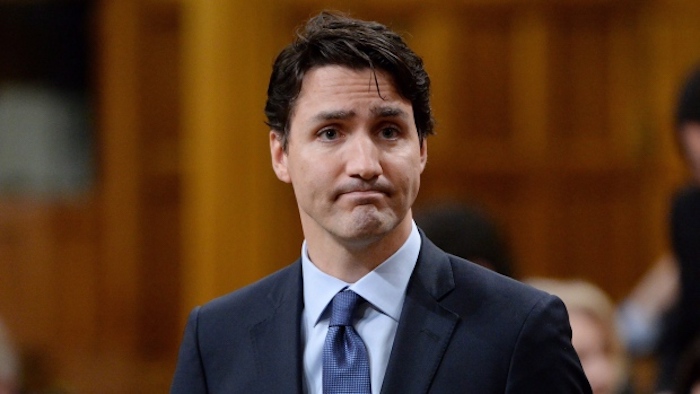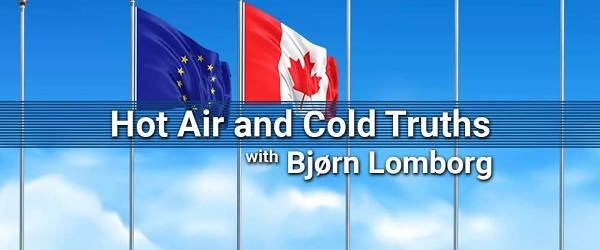Business
Carbon Tax poll reveals what we already knew

 Written By Dan McTeague of Canadians for Affordable Energy
Written By Dan McTeague of Canadians for Affordable Energy
The chickens are coming home to roost for the Trudeau government.
Last month (August 6th) Nanos Research released a new poll showing that two thirds of Canadians think that now is a bad time to increase the Carbon Tax. This is not exactly a shocking revelation. It really didn’t take a poll to determine what everyday Canadians already know. Adding a Carbon Tax to a struggling economy is a bad idea.
Anyone who has gone to the grocery store lately, or has filled up their vehicle, knows that the cost of living has skyrocketed. Social media is flooded with Canadians sharing their stories of how they are at the breaking point with the cost of living. It doesn’t take an economist to know that higher consumption taxes have the immediate effect of increasing the cost of everything. That has not stopped the green Agenda driven Trudeau government that seems determined to make life unaffordable for Canadians.
But back to that Nanos poll –
Let’s break this down a bit more to understand what this poll is really saying about how Canadians feel about Carbon Taxes.
First, it is evident that Nanos is approaching this poll with a clear bias in favor of Carbon Taxes. Participants were asked three (3) questions: 1) Do you think a carbon tax on things like gas is an effective, somewhat effective, somewhat ineffective, or ineffective way to encourage people to use less fuel? 2) Is now a very good, good, average, poor or very poor time to increase carbon taxes on things like gas? 3) On a scale from 0 to 10 where 0 is not at all effective and 10 is extremely effective, how effective do you think the federal government’s Carbon Pollution Pricing system, often called the carbon tax, is to combat climate change?
Notice the poll did not ask Canadians whether or not they think Carbon Taxes are a good idea or whether they want them at all.
The assumption is that Canadians buy into the narrative that climate change is real, and a “real problem” that requires government action, that “using less carbon” such as fuel is a key, if not the key, to reducing “carbon consumption”.
We know not every Canadian believes this; but the Nanos poll didn’t even ask.
That said, looking at the results of what they did ask, two thirds of Canadians say that now is a bad time to increase carbon taxes.
In the prairie provinces, this number was 79% and in Atlantic Canada 73% of respondents said the timing is “poor” or “very poor”.
Of even greater political significance: in Ontario, where the next federal election will likely be decided, a whopping 68.7% of respondents said that now is a bad time to increase the Carbon Tax. And yet Justin Trudeau keeps increasing this most hated tax.
In terms of effectiveness, 64.3% in Ontario think that a new carbon tax is not effective at encouraging people to use less fuel. This comes as no surprise. A majority of Canadians rely on their vehicles to get to work, the grocery store, kids practices, and family vacations. Normal daily activities for life in Canada. In most cases not driving is not an option. It only means that getting there is more expensive, and other items in the budget need to be sacrificed instead.
And as we know the Carbon Tax is one of the culprits for higher prices.
Conservative MP Kyle Seeback articulated it well in the House of Commons when he explained to Trudeau’s Environment Minister Stephen Guilbeault how the Carbon Tax is driving up inflation. “Mr. Speaker, it is incredible, he actually does not know how food ends up on his plate. The farmer pays a carbon tax, the truck that picks up the farmer’s food pays a carbon tax to take it to the processor, the processor pays a carbon tax, the truck that picks it up from the processor to take it to the grocery store pays a carbon tax, the grocery store pays a carbon tax and then Canadians cannot pay for food.”
Canadians for Affordable Energy has been advocating for affordability since 2017 and have known that Carbon Taxes are a threat to affordable energy in Canada and will drive up the cost of everything. And that is exactly what is happening. Fuel prices are skyrocketing, food prices are at record highs, and Canadians are struggling to make ends meet. Energy affordability is the key to success in Canada and therefore it is the view of CAE that there is never a good time to implement a Carbon Tax. Full stop.
Canadians are finally starting to connect the dots on a path that leads directly back to bad energy and environmental policies. Policies that have stifled our resource economy and punished working Canadians. Policies that are hitting Canadians’ pocketbooks really hard, especially when trying to fill up their vehicles and feed their families. Policies that won’t even help the environment.
Pierre Poilievre and his Conservative government have committed to scrapping the carbon tax. Let’s hope they follow through on this promise if they come into power in the next election. Because not all Canadians buy the narrative that Carbon Taxes are a good thing.
2025 Federal Election
Does Canada Need a DOGE?

From the Fraser Institute
By Philip Cross
The legions of Canadians wanting to see government spending shrink probably look enviously at how Elon Musk’s Department of Government Efficiency (DOGE) is slashing some government programs in the United States, even if DOGE’s non-surgical chainsaw approach is controversial, to say the least.
Some problems are common to cutting any government’s spending. Ironclad job security for union employees with seniority means cuts are skewed disproportionately to junior staff still on probation, with the regrettable side effect of denying an injection of fresh blood into a sclerotic workforce. Cutting employees and not programs makes it easier for higher staffing to resume: as documented by Carleton University Professor Ian Lee in How Ottawa Spends, even prolonged bouts of austerity do not derail government spending from long-term trend of higher growth. Across the board cuts do not allow for the surgical removal of redundant or inefficient programs and poor performing employees.
Canada has some unique problems with federal government spending. Savoie documents how 41 per cent of federal civil servants are located in Ottawa, versus 16 per cent in Washington and 19 per cent in London, despite Canada having the most decentralized federation in the G7. The concentration in Ottawa partly reflects the exceptional influence exerted by central agencies on all departments. As well, University of Cambridge Professor Dennis Grube found Canada’s civil service was the most resistant to public scrutiny and the most risk adverse in a comparative study of public servants in the U.S., the United Kingdom, Australia, New Zealand and Canada.
Canada’s federal employees are among the most expensive anywhere. The average civil servant costs taxpayers $146,500 a year including all salary, benefits and costs such as computers and training. Multiplying this average cost by 366,316 federal employees yields a total labour bill of $53.7 billion, not including other spending such as $17.8 billion on consultants. All the recent increase in the ranks of the civil service happened in Justin Trudeau’s tenure, expanding 38.5 per cent after Stephen Harper had cut them 9 per cent between 2010 and 2015 in his determination to balance the budget.
While the cost of government employees has risen sharply, the services they provide to the public are dwindling as government spending increasingly is devoted to managing its unwieldy and bloated bureaucracy. As Savoie observes, unions like to paint civil servants as providing essential services such as food inspectors and rescue workers, when in reality most are involved in a vast web of “policy, coordination, liaison, and performance evaluation units.” The fastest growing occupations in the federal government are in administrative services and program administration, whose share of jobs rose from 25.1 per cent in 2010 to 31.9 per cent in 2023 according to the latest report from the Treasury Board.
A chronic problem is the fierce defense offered by public service unions in “protecting non-performers and insulating the public sector from effective outside scrutiny” as Savoie wrote. The refusal to acknowledge and root out non-performers depresses the morale of the average civil servant who’s unfairly tarred with the reputation of a minority. It also motivates the across-the-board chainsaw approach of DOGE, which critics then decry as not discriminating between good and bad employees. The latter could easily be targeted by senior managers, who know exactly who the non-performers are but cannot be bothered with the years of documentation and bureaucratic headaches needed to get rid of them. The cost of poor performers is substantial; if even 10 per cent of the civil service was eliminated as redundant non-performers, the government would save $5.4 billion a year. Potential savings are likely well over $10 billion.
The federal government potentially has enormous leverage in negotiating civil service pay and getting rid of non-performers, because it can unilaterally change the federal pension plan without negotiating with public-sector unions. The federal pension plan is so generous that it’s referred to as the “golden handcuffs” that tie employees to their jobs irrespective of their pay or working conditions. To protect their lucrative pensions, unions inevitably would be willing to make concessions that substantially lower the burden on Canada’s taxpayers and still improve morale within the civil service.
2025 Federal Election
Don’t double-down on net zero again

From the Fraser Institute
In the preamble to the Paris Agreement, world leaders loftily declared they would keep temperature rises “well below 2°C” and perhaps even under 1.5°C. That was never on the cards—it would have required the world’s economies to effectively come to a grinding halt.
The truth is that the “net zero” green agenda, based on massive subsidies and expensive legislation, will likely cost more than CAD$38 trillion per year across the century, making it utterly unattractive to voters in almost every nation on Earth.
When President Trump withdrew the United States from the Paris Climate Agreement for the first time in 2017, then-Canadian Prime Minister Justin Trudeau was quick to claim the moral high ground, declaring that “we will continue to work with our domestic and international partners to drive progress on one of the greatest challenges we face as a world.”
Trudeau has now been swept from the stage. On his first day back in office, President Trump signed an executive order that again begins the formal, twelve-month-long process of withdrawing the United States from the Paris Agreement.
It will be tempting for Canada to step anew into the void left by the United States. But if the goal is to make effective climate policy, whoever is Canada’s prime minister needs to avoid empty virtue signaling. It would be easy for Canada to declare again that it’ll form a “coalition of the willing” with Europe. The truth is that, just like last time, that approach would do next to nothing for the planet.
Climate summits have generated vast amounts of attention and breathless reporting giving the impression that they are crucial to the planet’s survival. Scratch the surface, and the results are far less impressive. In 2021, the world promised to phase-down coal. Since then, global coal consumption has only gone up. Virtually every summit has promised to cut emissions but they’ve increased almost every single year, and 2024 reached a new high.
Way before the Paris Agreement was inked, the Kyoto Protocol was once sold as a key part of the solution to global warming. Yet studies show it achieved virtually nothing for climate change.
In the preamble to the Paris Agreement, world leaders loftily declared they would keep temperature rises “well below 2°C” and perhaps even under 1.5°C. That was never on the cards—it would have required the world’s economies to effectively come to a grinding halt.
The truth is that the “net zero” green agenda, based on massive subsidies and expensive legislation, will likely cost more than CAD$38 trillion per year across the century, making it utterly unattractive to voters in almost every nation on Earth.
The awkward reality is that emissions from Canada, the EU, and other countries pursuing climate policies matter little in the 21st century. Canada likely only makes up about 1.5 per cent of the world’s emissions. Add together Canada’s output with that of every single country of the rich-world OECD, and this only makes up about one-fifth of global emissions this century, using the United Nations’ ‘middle of the road’ forecast. The other four-fifths of emissions come mostly from China, India and Africa.
Even if wealthy countries like Canada impoverish themselves, the result is tiny — run the UN’s standard climate model with and without Canada going net-zero in 2050, and the difference is immeasurable even in 2100. Moreover, much of the production and emissions just move to the Global South—and even less is achieved.

One good example of this is the United Kingdom, which—like Prime Minister Trudeau once did—has leaned into climate policies, suggesting it would lead the efforts for strong climate agreements. British families are paying a heavy price for their government going farther than almost any other in pursuing the climate agenda: just the inflation-adjusted electricity price, weighted across households and industry, has tripled from 2003 to 2023, mostly because of climate policies. This need not have been so: the US electricity price has remained almost unchanged over the same period.
The effect on families is devastating. Had prices stayed at 2003 levels, an average family-of-four would now be spending CAD$3,380 on electricity—which includes indirect industry costs. Instead, it now pays $9,740 per year.
Rising electricity costs make investment less attractive: European businesses pay triple US electricity costs, and nearly two-thirds of European companies say energy prices are now a major impediment to investment.
The Paris Treaty approach is fundamentally flawed. Carbon emissions continue to grow because cheap, reliable power, mostly from fossil fuels, drives economic growth. Wealthy countries like Canada, the US, and European Union members have started to cut emissions—often by shifting production elsewhere—but the rest of the world remains focused on eradicating poverty.
Poor countries will rightly reject making carbon cuts unless there is a huge flow of “climate aid” from rich nations, and want trillions of US dollars per year. That won’t happen. The new US government will not pay, and the other rich countries cannot foot the bill alone.
Without these huge transfers of wealth, China, India and many other developing countries will disavow expensive climate policies, too. This potentially leaves a rag-tag group led by a few Western European progressive nations, which can scarcely afford their own policies and have no ability to pay off everyone else.
When the United States withdrew from the Paris Agreement in 2017, Canada’s doubling down on the Paris Treaty sent the signal that it would be worthwhile spending hundreds of trillions of dollars to make no real difference to temperatures. We fool ourselves if we pretend that doing so for a second time will help the planet.
We need to realize that fixing climate change isn’t about sanctimonious summits, lofty speeches, and bluster. In coming weeks I’ll outline the case for efficient policies like innovation, adaptation and prosperity.
-

 Podcasts2 days ago
Podcasts2 days agoTrump’s Tariffs: The US, Canada, and the rest of the world
-

 2025 Federal Election2 days ago
2025 Federal Election2 days agoMark Carney Comes to B.C. and Delivers a Masterclass in Liberal Arrogance
-

 Alberta2 days ago
Alberta2 days agoProvince introducing “Patient-Focused Funding Model” to fund acute care in Alberta
-

 Alberta2 days ago
Alberta2 days agoMedical regulator stops short of revoking license of Alberta doctor skeptic of COVID vaccine
-

 2025 Federal Election2 days ago
2025 Federal Election2 days agoPoilievre to invest in recovery, cut off federal funding for opioids and defund drug dens
-

 Business2 days ago
Business2 days agoTrump threatens additional 50% tariffs on China, urges ‘patience’
-

 International2 days ago
International2 days agoUN committee urges Canada to repeal euthanasia for non-terminally ill patients
-

 Business2 days ago
Business2 days agoTrump eyes end of capital gains tax in 2025







